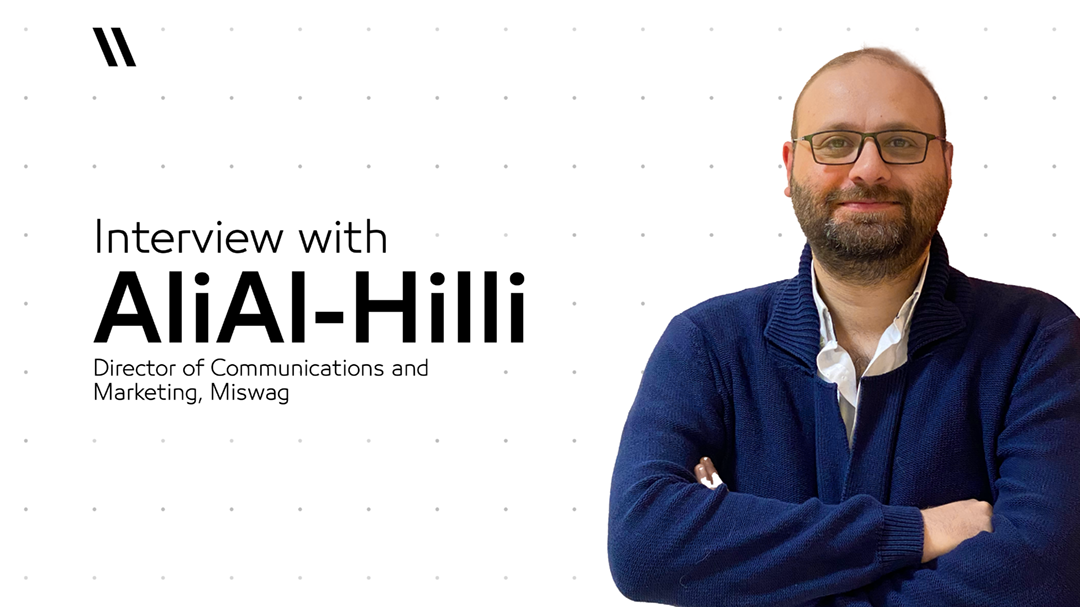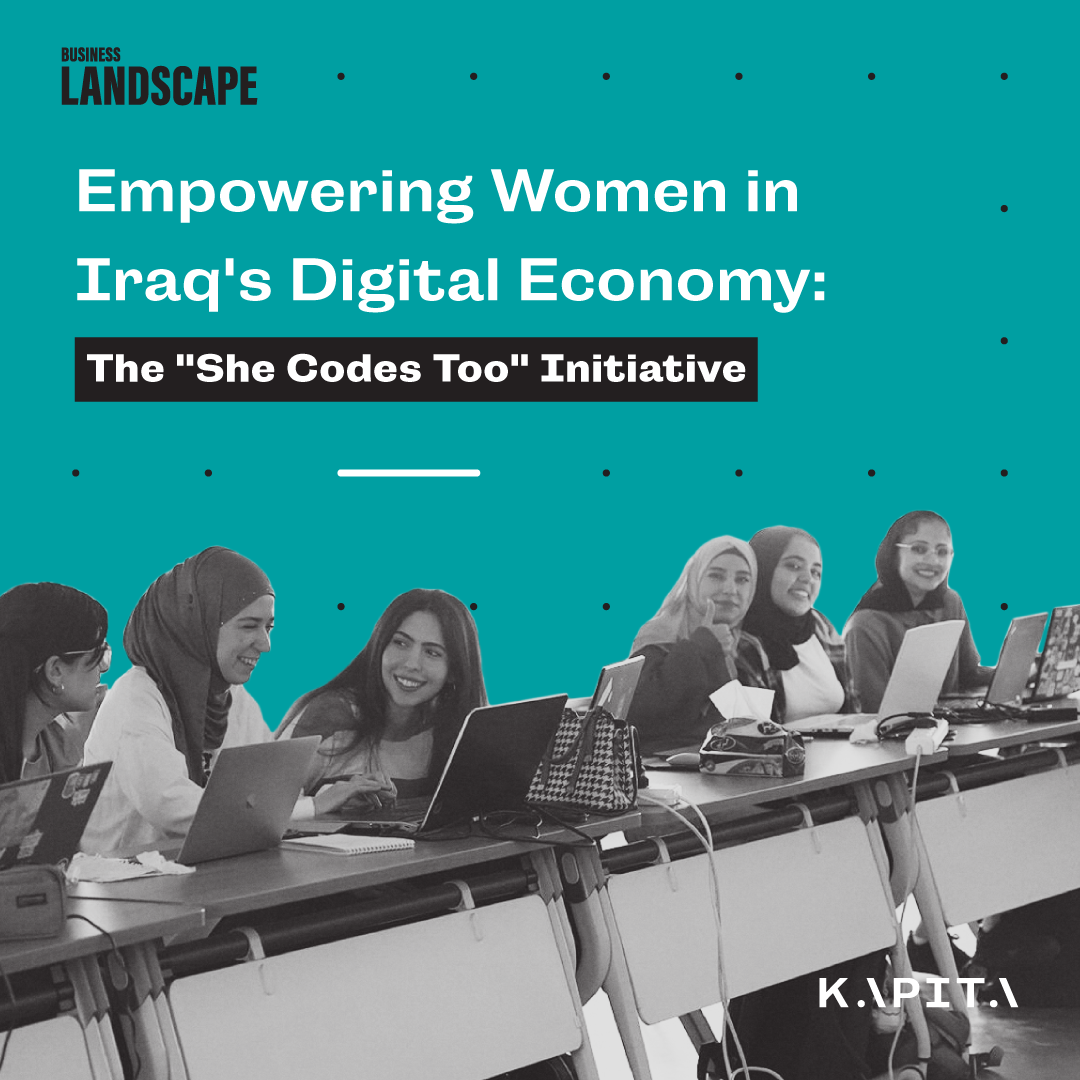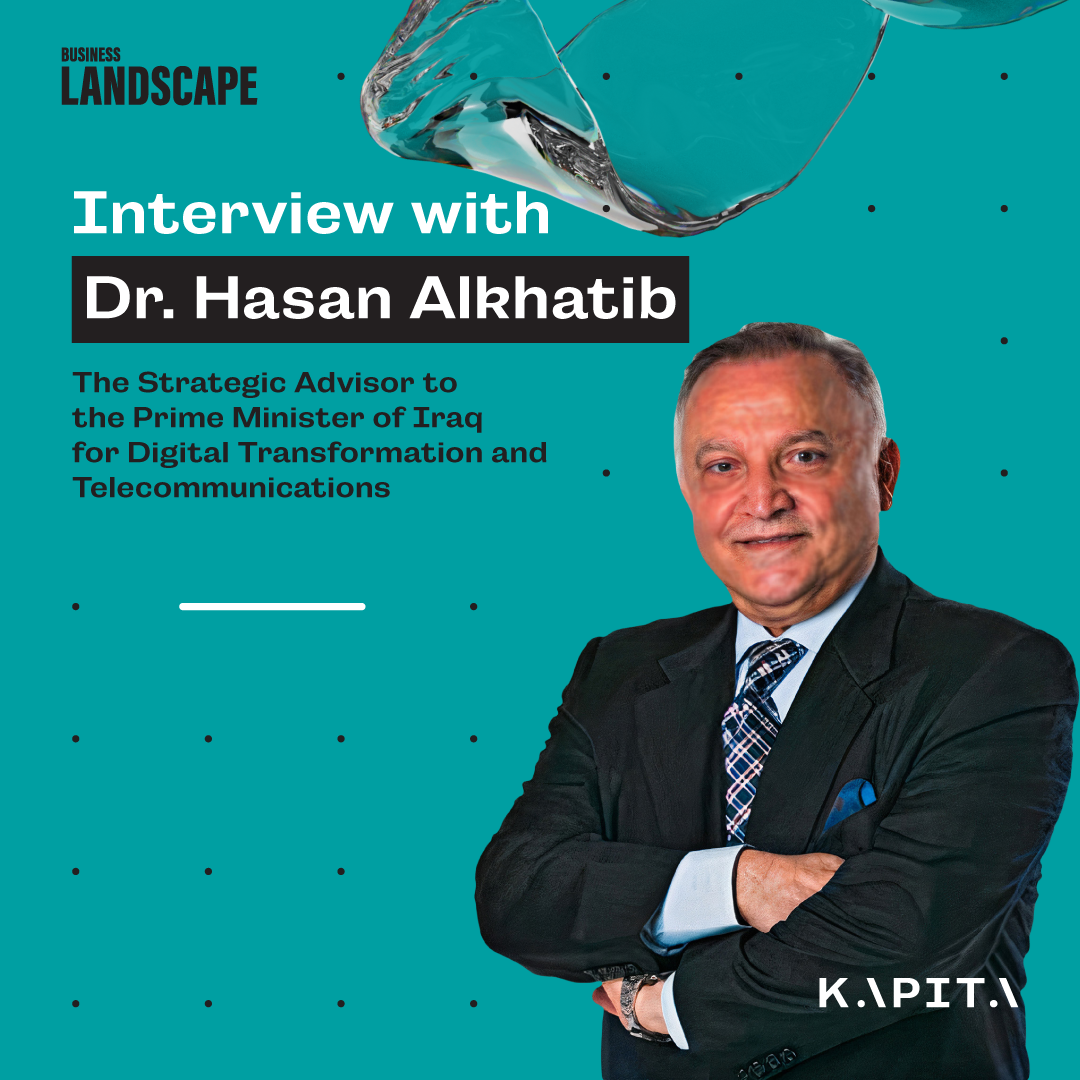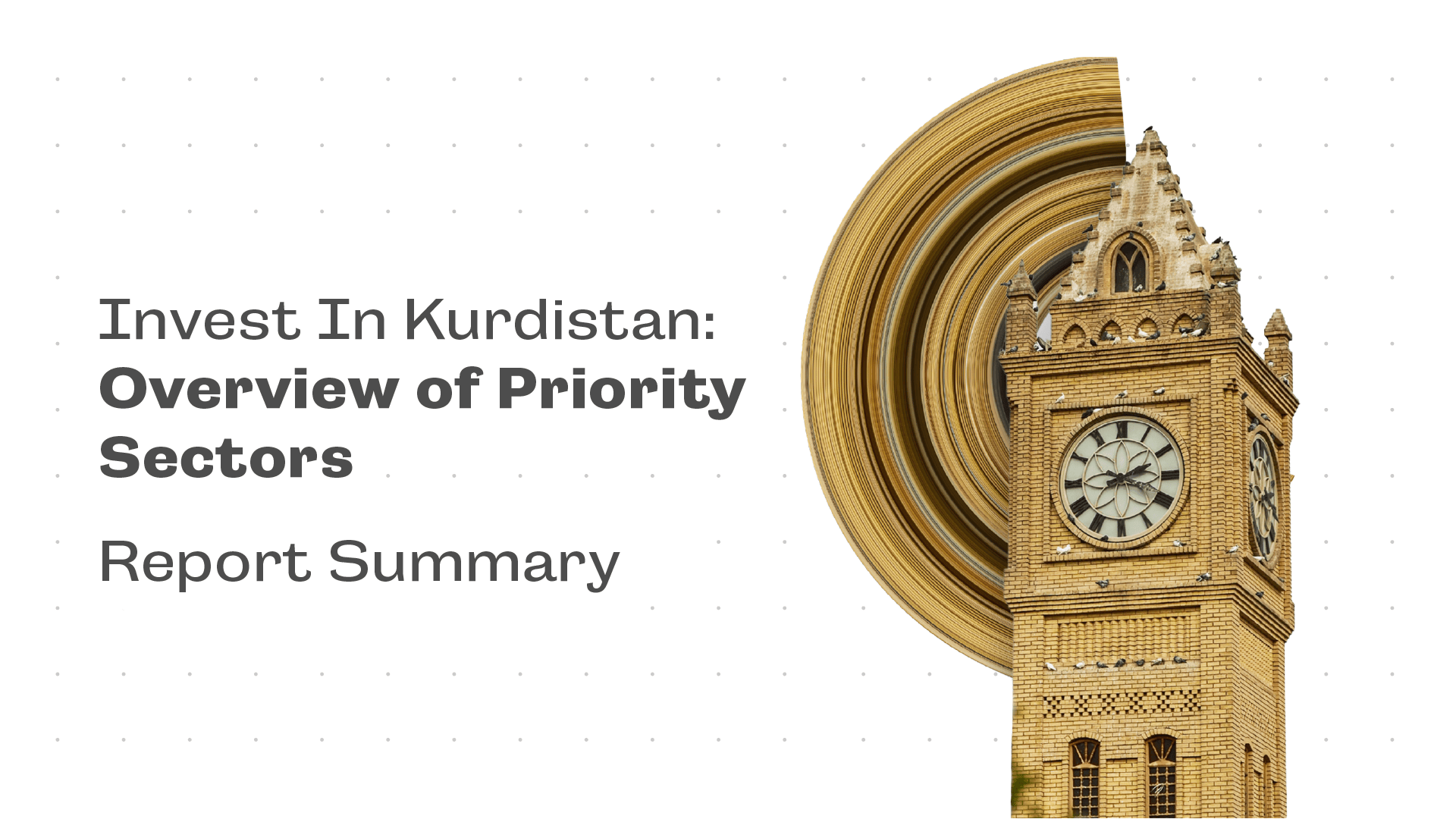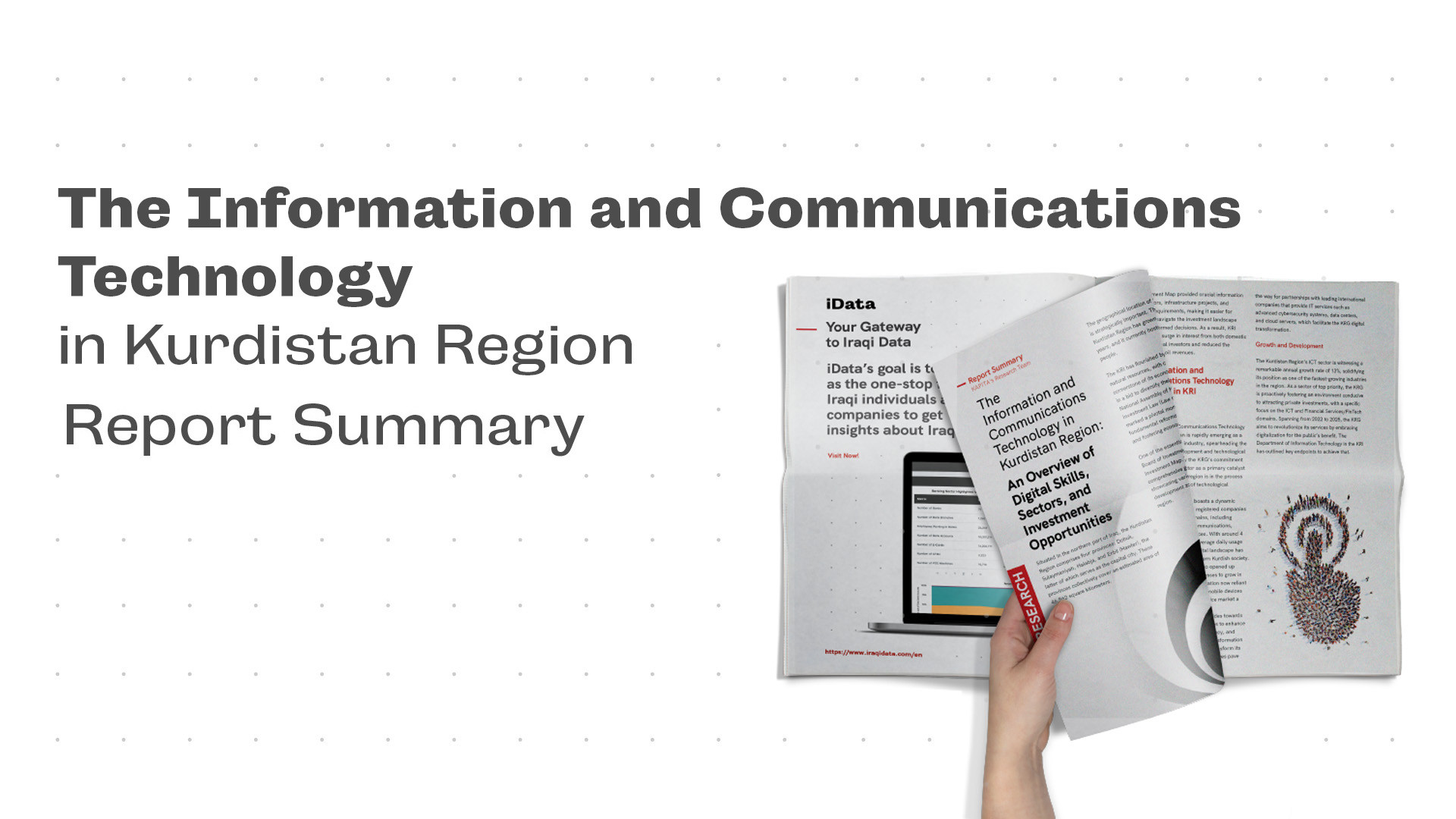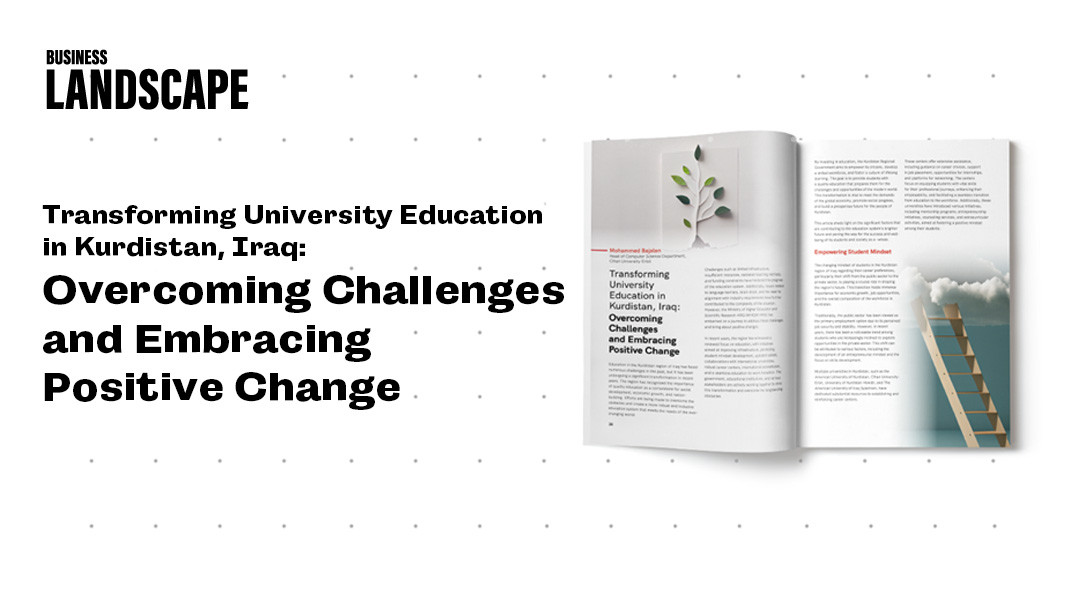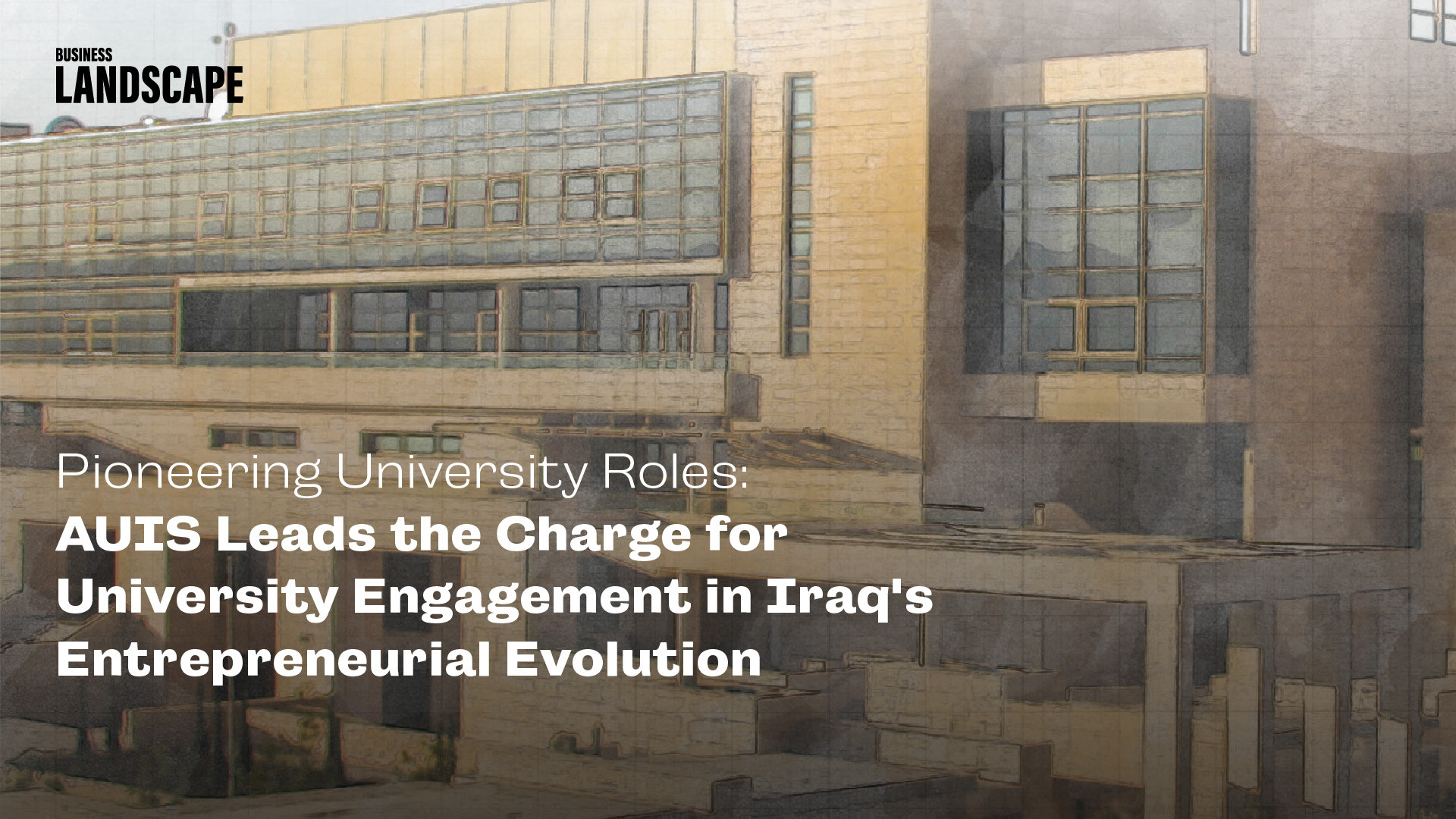Business LANDSCAPE Interview
Ali Al-Hilli
Marketing and Communications Director, Miswag
Ali Al-Hilli is the marketing and communications director at Miswag, the largest and oldest homegrown startup in Iraq. With more than 14 years of experience in business development, telecommunications, and FinTech, Mr. Al-Hilli has made a significant contribution to the development of the Iraqi ecosystem by fostering entrepreneurship and innovation.
In this interview, Mr. Al-Hilli walks us down memory lane of the last decade, telling us the development story of the Iraqi ecosystem from the moment he first got in touch with the organizers of the first-ever Startup Weekend in Iraq in 2013 until his role in facilitating the ecosystem open dialogues in 2023 that aims to unify the local players to address the challenges and collaboratively build a pipeline to promote Iraqi startups.
In addition, he reflects back on his experience in the Jordanian ecosystem, his career at Zain, and his role in building Zain Innovation Campus in Iraq. Furthermore, he touches on critical topics, such as digital transformation, the role of startups in accelerating this transformation, the issue of company registration, and the current government efforts in supporting entrepreneurship.
We would love to know more about you and your background.
My background is the cross-section of tech and business. I obtained my bachelor’s degree in software engineering from Al Ahliyya Amman University and then pursued my master’s degree in business administration at New York Institute of Technology (NYIT). My previous experiences include working in software development startups, gaming development studios, marketing agencies, telecom, fintech, and most recently, e-commerce. It is a multidimensional path that I was lucky enough to take so that I am exposed to different industries that combine technology with business development.
Early in my career, I was very interested in Social Responsibility in general. I come from a family that takes social responsibility seriously and wakes up every day with a mission to help people, so it was ingrained in me from an early age. While serving in many social causes, initiatives, NGOs, and organizations, I discovered that there is a social responsibility that involves helping young people identify their goals and find their career paths. At that point, I dismantled my thoughts about CSR and embraced this mentality. My previous experience involved feeding people and providing shelter, which in practice was unsustainable in the long run. However, 11 years ago, I shifted my focus to empowering individuals by teaching them valuable skills to improve their job opportunities and future prospects.
When considering a job opportunity, what are you seeking?
In the beginning, one would just want to jump into the job market, occupy any position after graduation, and then start developing a business consciousness that allows them to know what they are looking for in a job. What drives me is the end goal of the task and the objectives accomplished throughout my time at that company. At the same time, the corporate direction matters—if their beliefs, motivations, and goals are aligned with mine.
How did you get involved in the entrepreneurial ecosystem, first in Jordan and then in Iraq?
I was in Jordan when the Jordanian ecosystem started being constructed. We woke up one day in 2009, reading the news about Yahoo acquiring Maktoob. This made us all think we could start building a business and get acquired or obtain an investment. There was a huge revolution in Jordan, even in education, infrastructure, and corporate direction. The corporates started having these initiatives of helping youth create their own ventures and then potentially investing in them.
The Jordanian ecosystem was constructed collaboratively. All the community leaders and entities sat together at one table and discussed opportunities and challenges. By the end of 2012, I was taking part in the Economic Policy Development Forum (EPDF), founded by H.E. Dr. Talal Abu Ghazaleh. I was involved with Google student ambassadors to invest in and promote Google tools at the university. In a conversation with my mentor, Dr. Saad Al-Momen, currently a faculty member at Baghdad University, I told him, “I am doing a lot of things for the ecosystem in Amman. Do they need that support in Baghdad?” Dr. Saad mentioned organizing the first tech hackathon in Baghdad, which was the first Startup Weekend. I contacted the organizing team and expressed my interest in the digital hackathon, which signaled the beginning of my involvement in the Iraqi ecosystem in 2013.
The first day of the Startup Weekend consisted of pitching ideas. By the end of the third day, we started seeing MVPs; I was astounded - youth as young as 15-year-olds competing with 30 to 35-year-olds, high school students competing with graduates, and company employees. I started following the Startup Weekend activities in different cities between Iraq and Jordan. By 2014, I reactivated the Jordanian chapter that had been in hibernation for a year and a half; in addition to my day job, I was working on reigniting Startup Weekend in Jordan.
My first Startup Weekend in February 2014 was held at the Talal Abu-Ghazaleh facility as I was a member of the economic forum. On the second day of the hackathon, we were visited by Rasha Barakat from Zain Jordan, who helped us with the internet connections that were down for a few hours. A week later, she invited me to their office, and she expressed her interest in Startup Weekend and that they would like to sponsor us for the long run. She later became my longtime mentor. It was then that my journey with Zain started. I suggested bridging the connection with Zain Iraq to initiate and sponsor Startup Weekends in Iraq. We spent six years of continuing support from Zain to Startup Weekends, both in Jordan, Iraq, and other MENA Region countries, including a fully sponsored Startup Weekend in Sudan by the end of 2014.
Could you shed light on how the Zain Innovation Campus (ZINC) initiative has promoted innovation and entrepreneurship in Iraq?
The ZINC initiative started in Jordan with Zain Jordan investing and creating a hub for entrepreneurs. This hub would help develop digital solutions and services, which can help tech and telecom companies communicate and expand their services and understand youth more. After the success in Jordan, Zain Group adopted the idea; then ZINC Kuwait was launched.
Iraq was next in line due to its population and Zain’s subsidiary size. I was invited by Hayder Akab to bring the ZINC experience to Iraq. However, the absence of an ecosystem in Iraq created a discouraging environment, and we were not ready to have innovation campuses. A number of Startup Weekend activities, with a concentration in Baghdad, Erbil, and Basra, were taking place, yet the culture of startup and founder mentality were missing. In 2016, we started collecting data and created the system, the objective, and the team. A year later, we engaged in various activities to spark the ecosystem.
Thus, we ignited multiple communities and teams In 2017 through a six-month runway of continuous activities for over 15 different communities in different cities, a total of 37 activities with Fikra Space, Google developer groups, Facebook developer circles, and Startup Weekend. We went even further to the Google developer groups on the regional level to start a chapter in Iraq. The ecosystem was being created, and things developed gradually. In 2018, we started gathering data for different cities across the country like Kirkuk, for instance, in Kirkuk’s governorate - the skills required by youth to engage and kick off the scene there and the capital needed to accomplish that. The COVID pandemic delayed the plan to launch the First ZINC facility in Baghdad by one year.
ZINC functions as a platform to introduce startups to our regional partners, as Zain exists regionally in 7 different countries. This way, it could bring different VCs, angel investors, or even supporting entities from abroad to the ecosystem. It was the roadmap we created and followed in the organization. I spent 5 years at Zain from 2016 to 2021, following that roadmap.
The year 2018 witnessed the opening of The Station, followed by KAPITA in 2019. In late 2018, GIZ started moving around the country and partnering with different entities. As a result, we started not only creating the height but also supporting its growth in order for the ecosystem to grow continuously. Once those entities and others were established, more firepower was added to the whole scene. Then, we had to find ways to collaborate and unify our efforts.
The Jordanian ecosystem is quite different from its Iraqi counterpart. In the former, everybody would sit at the same table; in the latter, the personality does not allow that. You have to compromise and ask others to compromise to sit together and create this kind of ecosystem. If we had moved forward with creating hubs or ZINC from the very beginning, the plan would have failed. There would not be anyone to populate those buildings and utilize the facilities. Since we were working on a nationwide strategy, we had some KPIs on different levels. This way, when we established ZINC, it was fully functional.
How do you think Startup Weekend shaped the Iraqi entrepreneurial scene?
When I came to Iraq to run the entrepreneurial profile at Zain, the first task I did was navigating the history of the ecosystem itself: Who started what? Aside from Fikra Space by Bilal Ghalib, which was the start of all the tech communities in Iraq, Startup Weekend was the grand operation that sparked the entrepreneurial Big Bang in 2013.
The whole idea of Startup Weekend is the community and culture. When we were organizing Startup Weekend in Amman, I met with the lead organizers. They made available all the resources and networks to find sponsors, mentors, and partners. We pass this on to all the Startup Weekend organizers' generations. Today, the admin panel of Startup Weekend in Baghdad has 12 admins serving since 2013. All of them are there to help the current team with connections, networks, sponsorship opportunities, mentorship, and resources. If those admins are a part of a specific company, they are obligated to provide mentors, judges, speakers, or any other kind of resources available. Miswag, like any other company, has a responsibility to help the current team with connections, networks, sponsorship opportunities, mentorship, and resources, to name a few. This was understood and comprehended from day one by all of the organizers and participants. The success of our predecessors is not by chance, but a product of the support, a foundation built by different generations of leaders. Everybody plays their role. It keeps producing more community leader generations.
Startup Weekend, as an activity, used to be owned by Up Global based foundation in Seattle, US and was acquired by Techstars, the biggest accelerator in the world. It became one of their arms to create communities in cities.
Startup Weekend supplies the demand for startups, and organizations, such as Techstars, would send their VCs to invest in these startups and ideas. Dropbox and Easy Taxi in Brazil are quick examples of products of Startup Weekends.
Why is the Iraqi ecosystem fragmented?
Iraq has not experienced stability until recently. It has been through 3 wars, 10 years of economic sanctions, a civil war, and ISIS. What happened is that we have lost faith in the system, the structure, and society, which is understandable. This fragmentation we are experiencing is a part of the evolution of the country; this is related to social science, not to entrepreneurship in particular. In other neighboring countries such as Jordan, where there is political stability, it helps create trust in the system and fosters cohesion and collaboration.
Can you tell us about the open discussions you are facilitating between ecosystem players? Why were they initiated? And what do they aim to achieve?
There are many challenges that are limiting the growth of the scene. To have a further understanding of them, we are engaging in open dialogues with all the players. The dialogues have produced one of the most sophisticated documents I have ever participated in. It is probably the five-star document KAPITA is publishing. We listened to all the players, combined all the challenges, and identified all the difficulties.
Those discussions aim to provide a solution to a need. In terms of regional investment, the country is finally awakening, which is a good sign. Regional institutions and VCs are directing their focus towards Iraq. The visit of Flat6Labs in March to Baghdad and meeting all the players is a reflection of that interest in the Iraqi market. I took the initiative to facilitate this meeting, which witnessed the first collaboration between the players. It was a demo day at The Station, where ten startups from The Station and KAPITA, five each, introduced their ideas in front of VCs. This means in order for the supply side, regional VCs, to be interested in the country, we have to unify and expand the demand. In other words, we need to build a pipeline to promote and take startups from the initial stages into growth, a level that would attract regional players. Today, all the local players have started understanding that they must join forces, share databases, and exchange knowledge to create this pipeline to promote more successful stories.
Recently, I was contacted by the Arab Bank Accelerator (ABX), one of the biggest banks in the Middle East. The bank is seeking investment opportunities in the fintech sector and early-stage startups. This confirms the purpose behind the Flat6Labs entry, opening the door for more investments. Therefore, everybody should be open to the dialogue to understand the challenges in order to reach solutions in the short run and work on shared objectives in the long run.
This is also aligned with the government strategy. Today’s government has an initiative called "Riyada," now, the question is why this government, in particular, not the previous ones? With each government, there were different priorities, which are as follows: establishing the democratic system, fighting ISIS, conducting the election, and empowering entrepreneurship. The executive branch in today’s government is more inclined towards this direction of job creation and fostering the economy.
What are the most pressing issues identified through those ecosystem discussions? And what are the possible solutions?
All the players in these discussions have agreed that company registration is a major pain point for the ecosystem. We do not aim to change the law but rather create a fast track for specific startups and provide facilities for tech startups and young entrepreneurs. These facilities could include custom discounts, tax aversion, reduced registration fees, and easier procedures for announcing bankruptcy. In legal terms, lawyers gauge the complexity of a document by the number of required signatures. Currently, opening a company in Iraq requires 23 signatures, while announcing bankruptcy requires 27 signatures, making it more complicated.
Another aspect we have been discussing is data sharing to enable us to track grant hunters who are individuals harming the ecosystem. We are also working on creating KPIs for ourselves as a group to ensure we follow good standards and provide quality outputs.
Do you think the government’s support is sufficient to support the Iraqi entrepreneurial scene? And what do we need to promote its growth?
The scene is still nascent and not yet mature enough. Today, most of the startups graduating from incubators or accelerators are between pre-seed and seed levels. Miswag and Alsaree3 are the only homegrown startups to reach Series A, while Toters, a non-Iraqi startup, is in Series B.
The government initiative “Riyada” aims to change cultural behavior, so it is not expected to yield immediate results; it will take a few years to get tangible results. I would say in the next three to four years, we will look back at this phase and hardly recognize it. Back in 2016 and 2017, we were experiencing a similar change, and when we look back at it now, we barely can recognize it either. This kind of progression occurs frequently.
The other day, I was at The Station participating in a panel discussion about digital payment transactions, whereas in 2017, we were discussing sponsorships, how to sponsor communities and activities, and printing out flyers. In four or five years’ time, we will be discussing ticket sizes of investments, both small and large. A ticket size refers to the amount of investment sought by a startup. As of now, our startups exist in a space where ticket sizes are relatively high for local investors and too small for regional investors to consider. Hence, we are stuck in the middle, where local investors do not see the value of startups despite the collected data and generated attraction, and they think the investment is too high for a startup. On the other hand, regional investors still believe that startups have not grown to a level that grabs their interest to invest.
Do you think our ecosystem is recycling startups? If so, is there a way to move away from this?
If our ecosystem is recycling startups, then it is happening by coincidence. The thing is that we still do not have what we can call an ecosystem yet. Our ecosystem is still a collection of initiatives that are not unified in one direction. With these dialogues, we have created a framework that spans different stages. This allows each entity to understand if they are working in the discovery phase, the mastery phase, the launch phase, the funding phase, or the growth phase. We are creating a common language, which will undoubtedly lead to collaboration, to transform this collection of initiatives into an actual ecosystem.
Is Iraq currently witnessing digital transformation? And how can we accelerate this?
I think we are a little bit late in terms of digital transformation, but digitizing or automating different industries and sectors requires several key factors. First is a solid internet infrastructure, which only materialized in 2021 with the launch of 4G, followed by Fiber to the Home (FTTH). The second thing is access to digital payments, where we have achieved considerable success in terms of issuing. There are now more than 16 million cards issued in the country. However, there are not enough usage cases for these cards, such as digital gateways, POS systems, or ATMs, to name a few.
This government has initiated efforts to accelerate digital payment implementation, such as introducing POS and digital payment methods in government institutions. Yet, sometimes, the regulations fall short in terms of utilization. We have the device, but what are our limits for using that device? How much is the government asking out of our total payment on that device? What kind of enforcement will accelerate this digital transformation in the payment system?
Then comes the broader automation within the government sector, where all ministries and institutions will develop their own systems and integrate with digital payments. Everything happens simultaneously. Currently, we can not introduce bill payments because most ministries' services are not automated. Thus, there is no use for digital payment. However, many institutions are beginning to collaborate with the private sector, international communities, and NGOs to understand this transformation better.
Additionally, there is pressure from the international community on Iraq to digitize. For instance, new regulations by the Federal Reserve toward the Central Bank of Iraq were put in place and started activation, followed by subsequent regulations. So, progress is occurring, and it will take four to five years. Looking back, before 2017 or 2016, Visa or Mastercard were unavailable due to the regulations of United Nations Article 7. Nowadays, 16 million cards are a significant achievement. Considering that 50% of the total population is below 18 years old, mathematically speaking, this means there are only 4 million adults without cards.
What attracted you to join Miswag, and what is your reflection on the e-commerce sector? Do you think that startups are influencing customer behavior and fostering digital transformation?
The objectives of the organization are what attract me, as well as the stage of the business where I can apply my role. From helping kick off the ecosystem with communities back in 2016 to being a part of the Miswag team and driving the progress forward towards Series A, the journey has been fulfilling. We became the first homegrown startup to cross that path, creating a success story and a milestone for the entire ecosystem. This challenge was meaningful, giving me more answers to what I have been doing over the past 7 years.
E-commerce is not yet widespread in the country; instead, social commerce is predominant. Miswag addresses various issues in digital commerce, such as the originality and authenticity of products, as well as transparency with product supply chains, from a consumer perspective. As for the merchants’ standpoint, we provide technology that enables them to reach more parts of the nation. In essence, we are primarily a tech company with a focus on e-commerce. We offer digital solutions for both customers and merchants to meet supply and demand.
It is possible for startups to change consumer behavior. Our partnership with Visa notably increased the penetration rate for digital transactions on e-commerce applications. It paved the way for other collaborations, like Visa partnering with Toters and, more recently, with Careem. They recognize the value a locally active application can bring to increase financial literacy.
What are we expecting in the ecosystem for the remainder of this year?
I hope that these open dialogues will result in a unified force toward achieving more access, tools, and empowerment for the ecosystem. There are also a few investments, acquisitions, and partnerships that are still being discussed behind closed doors. Certainly, there is more growth in digital transactions, e-commerce, social commerce, travel, ride-hailing, and food delivery. Everything is starting to go digital; everybody recognizes the opportunity and wants to participate in this revolution.
